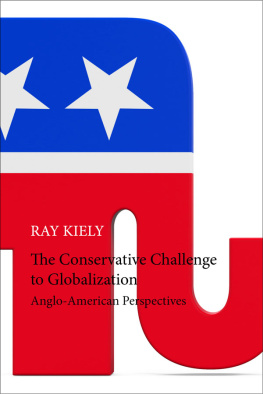First published 1995 by Routledge
Published 2013 by Routledge
2 Park Square, Milton Park, Abingdon, Oxon OX14 4RN
711 Third Avenue, New York, NY 10017, USA
Routledge is an imprint of the Taylor & Francis Group, an informa business
Ray Kiely, 1995
This book is copyright under the Berne Convention.
All rights reserved. No part of this book may be reprinted or reproduced or utilised in any form or by any electronic, mechanical, or other means, now known or hereafter invented, including photocopying and recording, or in any information storage or retrieval system, without permission in writing from the publishers.
British Library Cataloguing-in-Publication Data
A catalogue record for this book is available from the British Library.
Library of Congress Cataloging-in-Publication Data are available
ISBN 978-1-857-28195-8 (hbk)
ISBN 978-1-857-28196-5 (pbk)
Typeset in Classical Garamond.
Some of the arguments in were first developed in my article of 1995 entitled Third Worldist relativism: a new form of imperialism.
Thanks to the Department of Cultural Studies at the University of East London for its support and in particular for allowing me relief from full teaching requirements so that I could complete this work. In particular, thanks to Bill Schwarz for reading the complete draft. Also thanks to my most important critics, the students on the Perspectives on Development, Industrialisation and Development, and State Policy and Development courses at UEL from 1992 to 1994. More general thanks to my parents and the rest of my family, especially Jenny, Lynn and Shani (and the kids), for their support. Thanks also to Phil Mizen, Jane McAllister, James Nottidge, Chris Ashplant, Sanjiv Sachdev, Paul Butler, Seb Berry, Martin and Gerry Nicholson (and little Michael), Fiona Lehane, Kim Labbett, Andrew Burroughs, Andrew Branch and Kevin Taggart for their support and lack of sobriety.
Introduction:
The impasse summarized
The sociology of development is in crisis. The reasons are controversial and a matter of academic debate, but many writers agree that the discipline has reached something of an impasse (see, for example, Booth 1985, Mouzelis 1988, Sklair 1988, van der Geest & Buttel 1988, Corbridge 1986, 1989, 1990, Spybey 1992). Since its establishment as a separate discipline within the social sciences in the postwar world, development sociology has undergone a number of theoretical transformations, each of which attempted to overcome the inadequacies of the previous paradigm. However, the discipline has now reached a point where theoretical and conceptual innovation has largely dried up (but see Schuurman 1993, Booth 1994), which has led to an impasse on at least two fronts: first, an inability to move beyond the weaknesses of old paradigms, such as Marxism and dependency theory; secondly, and ultimately inseparable from the first point, an inability to come to terms with changes in the global order in the 1970s and 1980s (see especially Corbridge 1990: 623).
This book is concerned with explaining the reasons for the impasse, and suggesting ways of moving beyond it. Its focus is on Marxist and related theories of development and underdevelopment because these have dominated the field for the past 20 or so years. However, I do not ignore other theories, including anti-sociological theories of development such as neoliberal theory. Indeed, I argue that development sociology's narrow concern with the correct method has left it isolated from important debates, such as the counterrevolution in development economics (Toye 1987). Nevertheless, the core of the book concerns itself with Marxist theories. However, the main contention of the book is that the impasse is not confined to Marxist-oriented writings on development, and indeed that the impasse can be identified as a misguided attempt to construct ahistorical and technical models of development that actually fetishize, in Marx's sense, social reality.
Before moving on to the main body of the work, I want to present a summary history of theories in the sociology of development since 1945 and identify some of the problems associated with each of them. This summary will illustrate the reasons for the impasse, which are then briefly listed. I complete this introductory chapter by outlining the structure of the rest of the book.
Sociology and development since 1945
In post-war analyses of what came to be known as the Third World, modernization theory was established as the orthodoxy from the 1950s to the late 1960s (Rostow 1960, Hoselitz 1960, McClelland 1961, Apter 1965). This school of thought saw development as a succession of stages through which all societies (defined as the nationstate) must pass on their way to modernity. The advanced, modern Western world was seen as the end-point, the norm to which all other societies aspired. This form of functionalist sociology was criticized for its analysis of the reality of the Western world (Mann 1987), but also for its failure to grasp power relations within the international economy (Frank 1966). Such a critique formed the basis of an alternative model, known as underdevelopment theory, which argued that the advanced capitalist world exploited the backward Third World via a process of surplus transfer from periphery or satellite to the core or metropole (Baran 1957, Frank 1969a, b, Rodney 1972).
Although this alternative model, known as underdevelopment theory, was never entirely convincing, it did lead to renewed analysis of the inequities of the international economic order. Structuralist theorists such as Prebisch (1959) had criticized the terms on which Third World primary producers traded with the First World, and had argued (ironically, along with modernization theory) that industrialization in the periphery was essential to alleviate this problem. However, Frank and like-minded writers (Amin 1976, Wallerstein 1974) saw capitalist industrialization as part of the problem, because it sustained links with the world economy and so facilitated a continued process of surplus transfer from the Third to First World (Frank 1983).
The contentions of underdevelopment theory were in turn challenged by the rapid industrialization of some peripheral nations in the 1970s and 1980s (Warren 1973) and by a more orthodox school of Marxist theory, which focused on the mode of production (Laclau 1971). This challenge met with a strong defence by writers sympathetic to some of Frank's ideas but not to the rigidity of his notion of development as a zero-sum game (Cardoso & Faletto 1979). This school of thought, known as dependency theory, argued that development in the periphery was taking place, but it was in some sense dependent, and was led by the core nations.
The relationship between Marxism and these issues was ambiguous. Underdevelopment theory was clearly influenced by Marxist ideas, but was subject to strong methodological and empirical criticisms (Laclau 1971, Warren 1973, Brenner 1977). Frank was criticized for assuming rather than explaining the metropole/satellite division of the world (Dore & Weeks 1979), for his focus on trade rather than relations of production, and for his failure to explain the rapid industrialization of parts of the Third World. The response to these criticisms varied. One response was to return to the more optimistic ideas that Marx expressed about the capacity of colonialism to modernize traditional India, which led to Warren's (1980) thesis that imperialism was the pioneer of capitalism. Others rejected this evolutionary account, and employed an approach that suggested that the effects of capitalism in the Third World were contradictory. This led to the development of the modes of production school, which argued that the modern capitalist mode articulated with traditional non-capitalist modes, and in doing so gained certain benefits such as cheap labour or raw materials (see Foster Carter 1978, Wolpe 1980). This concept of articulation was often combined with a theory of the internationalisation of capital (Cypher 1979, Browett 1985), which examined the accumulation of capital on a global scale and the forms that this took in particular regions of the world. In some areas it was said to have led to just such an articulation, while in others it promoted rapid Third World industrialization and a new international division of labour (Frobel et al. 1980).










